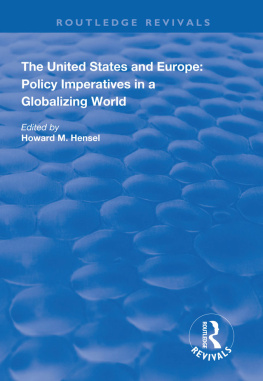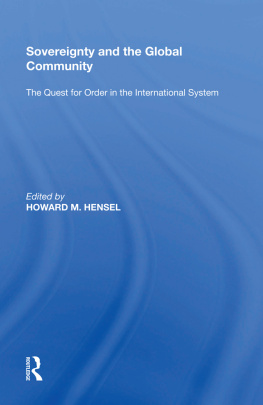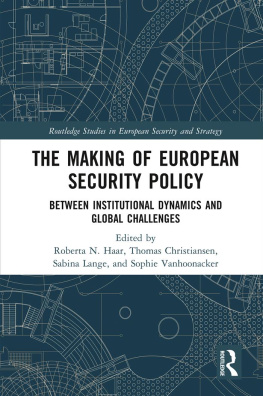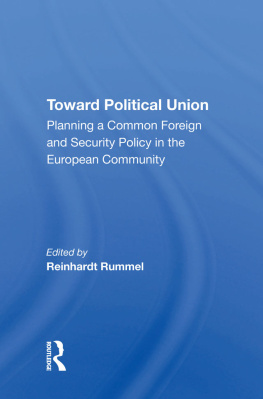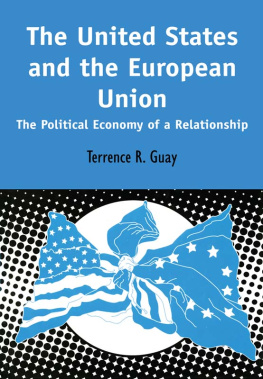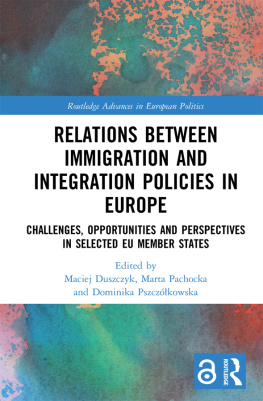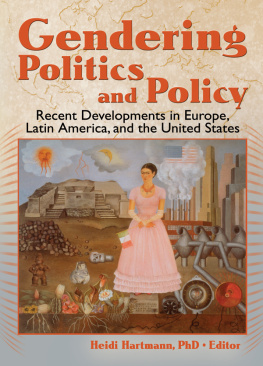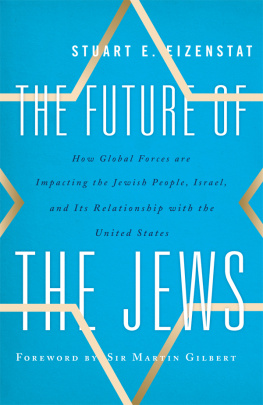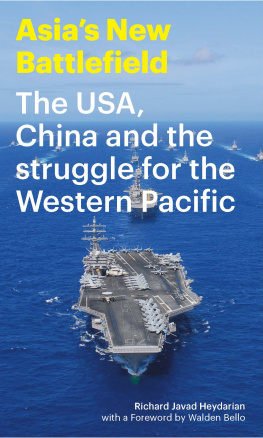THE UNITED STATES AND EUROPE: POLICY IMPERATIVES IN A GLOBALIZING WORLD
Global Interdisciplinary Studies Series
Series Editor: Professor Sai Felicia Krishna-Hensel, FRGS Auburn University Montgomery, USA
The Global Interdisciplinary Studies Series reflects a recognition that globalization is leading to fundamental changes in the world order, creating new imperatives and requiring new ways of understanding the international system. It is increasingly clear that the next century will be characterized by issues that transcend national and cultural boundaries, shaped by competitive forces and features of economic globalization yet to be fully evaluated and understood.
Comparative and comprehensive in concept, this series explores the relationship between transnational and regional issues through the lens of widely applicable interdisciplinary methodologies and analytic models. The series consists of innovative monographs and collections of essays representing the best of contemporary research, designed to transcend disciplinary boundaries in seeking to better understand a globalizing world.
Also in the series
The New Millennium: Challenges and Strategies for a Globalizing World
Edited by Sai Felicia Krishna-Hensel
ISBN 0 7546 1391 7
The United States and Europe: Policy Imperatives in a Globalizing World
Edited by
Howard M. Hensel
First published 2002 by Ashgate Publishing
Reissued 2018 by Routledge
2 Park Square, Milton Park, Abingdon, Oxon OX14 4RN
711 Third Avenue, New York, NY 10017, USA
Routledge is an imprint of the Taylor & Francis Group, an informa business
Copyright Howard M. Hensel 2002
The editor and contributors have asserted their moral right to be identified as the the authors of this work in accordance with the Copyright, Designs and Patents Act, 1988.
All rights reserved. No part of this book may be reprinted or reproduced or utilised in any form or by any electronic, mechanical, or other means, now known or hereafter invented, including photocopying and recording, or in any information storage or retrieval system, without permission in writing from the publishers.
Notice:
Product or corporate names may be trademarks or registered trademarks, and are used only for identification and explanation without intent to infringe.
Publisher's Note
The publisher has gone to great lengths to ensure the quality of this reprint but points out that some imperfections in the original copies may be apparent.
Disclaimer
The publisher has made every effort to trace copyright holders and welcomes correspondence from those they have been unable to contact.
A Library of Congress record exists under LC control number: 2002074454
ISBN 13: 978-1-138-72066-4 (hbk)
ISBN 13: 978-1-315-19495-0 (ebk)
Contents
Howard M. Hensel
Yannis A. Stivachtis
Joyce P. Kaufman
Roger E. Kanet and Nouray V. Ibryamova
Andrew Dorman
Glen M. Segell
Maria Raquel Sousa Freire
Zdzislaw W. Puslecki
Joseph E. Vorbach III
Daniel S. Papp
Andrew Dorman , Lecturer in Strategic Studies; Joint Services Command and Staff College, United Kingdom
Maria Raquel Sousa Freire , Professor, Universidade Lusiada, Portugal
Howard M. Hensel , Professor of Politico-Military Affairs, Air War College, United States
Nouray V. Ibryamova , School of International Studies, University of Miami, United States
Roger E. Kanet , Professor, School of International Studies, University of Miami, United States
Joyce P. Kaufman , Professor of Political Science, Whittier College, United States
Daniel S. Papp , Senior Vice-Chancellor for Academics and Fiscal Affairs, University System of Georgia, United States
Zdzislaw W. Puslecki , Professor, Institut of Political Science and Journalism, Adam Mickiewicz University, Poland
Glen M. Segell , Director, Institute of Security Policy, United Kingdom
Yannis A. Stivachtis , Professor of International Relations, Schiller International University, Switzerland
Joseph E. Vorbach III , Assistant Professor of International Relations, U.S. Coast Guard Academy, United States
Howard M. Hensel
Relations between the United States and Europe have been inextricably intertwined since the birth of the American republic over two and a quarter centuries ago. From its inception, the principles and values that served as the foundation for the United States' identity were rooted in the ideas of the Enlightenment. Similarly, from colonial times forward through the 225 years since independence, socioeconomic bonds have continuously linked America with Europe. Moreover, throughout most of the 20th Century, the political fate of Europe has been closely tied to, and even hinged upon, the politico-military involvement of the United States in European affairs. Between 1917 and 1918 and again between 1941 and 1945, the United States intervened in the two most destructive wars in recorded history in order to prevent Germany from dominating the continent and to protect the independence, territorial integrity, and socio-politico-economic freedom of the European peoples. For four and a half decades following victory in the second of these conflicts, between 1945 and 1991, the centerpiece of U.S. foreign policy was the protection of European independence and socio-political freedom against the threat of Soviet continental domination. Simultaneously, in the aftermath of World War II, the United States dedicated significant American resources to rebuilding Europe's shattered economy and, throughout the remainder of the 20th Century, continuously sought to promote European economic prosperity. Today, at the dawn of the 21st Century, political, military, economic, and socio-cultural ties between the U.S. and Europe are not only central to both Americans and Europeans, the course of events throughout Europe and, indeed, the remainder of the international community will be heavily, if not decisively influenced by the relationship between the United States and its European partners.
The purpose of this work is to frame the context and explore aspects of the contemporary relationship between the United States and the European powers as they attempt to address common challenges and opportunities as the international community enters a new millennium. Most of the material embodied in this work was prepared for and presented at the annual Millennium Conferences of the Comparative and Interdisciplinary Studies Section of the International Studies Association. These annual events represent an effort by academic scholars and policy makers, drawn from a variety of backgrounds and bringing with them varying perspectives, to apply the various methodological approaches of diverse disciplines to better conceptualize and analyze contemporary policy challenges and opportunities and to formulate effective policy responses within the international arena.
attempts to define the sources, evolution, contemporary context, and parameters for American foreign policy, as applied throughout the international arena. Specifically, it attempts to define and analyze the principles and values which underpin American foreign policy, delineate the national interests pursued by the United States since the inception of the republic, trace patterns of continuity and change in American foreign policy as these interests have been prioritized and translated into national objectives during the two and a quarter centuries since American independence, and, finally, outline and assess contemporary U.S. national objectives, as they apply generally throughout the entire international system, as well as, specifically, within the individual regions and sub-regions of the international arena. The chapter serves to set the stage for an analysis in subsequent chapters of some of the contemporary challenges and opportunities confronting the United States and the European powers. In addition, it provides historical and global perspective for their assessment of the U.S.'s strategic initiatives and responses, utilizing a variety of policy instruments, to individually and, in concert with its European partners, address the challenges and capitalize upon the opportunities that characterize the global and European regional environment at the outset of the new century.

